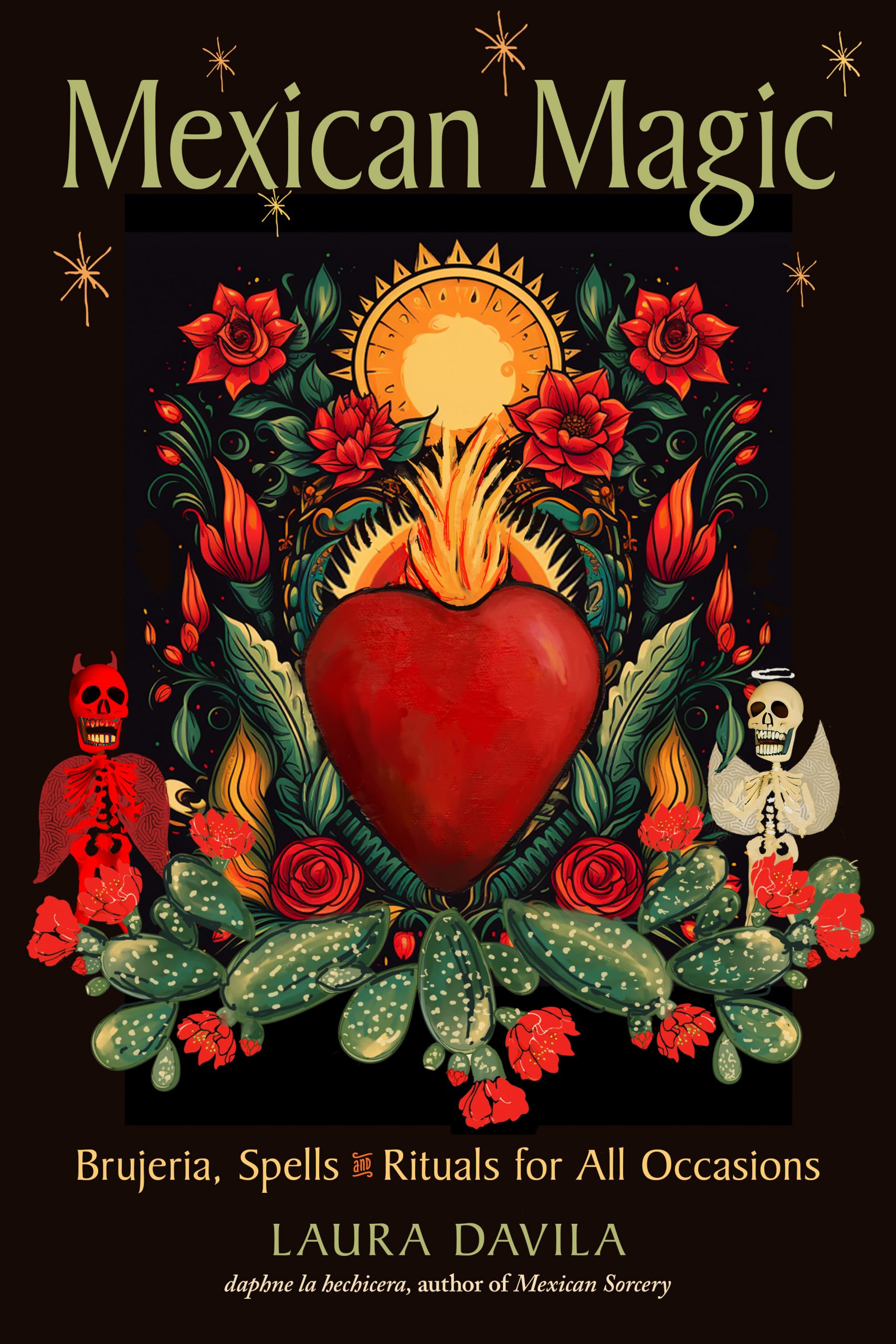An Excerpt from “Mexican Magic” by Laura Davila
“Algunos nacen con estrella y otros estrellados.”
This dicho (saying) roughly translates to “Some are born with a star, while others are born starry.” It refers to the Mexican belief that good luck is a matter of fate, something we were either born with or not. Most Mexicans attribute their good or bad luck to a greater force, to God’s will, even to the placements of the stars in the sky. Being born with a star is a blessing and being born shattered is a misfortune for some.
Yes, I do believe in destiny. I do believe in fate, like most Mexicans, but also like most Mexicans I believe even more in faith, virtue, and purpose. Just like there are many who are born to do magic, there are many others where life itself and being born starry pushed towards magic. Being a Mexican bruja is being part of a fight between what the stars say up there and what my heart dictates down below, although my faith leads me to think that the stars and my heart are linked to the plan of life that a greater force has for me.
The best brujos and magical people that I’ve had the honor to know were people who were not born with good luck, those whose destiny didn’t give them a good hand of cards to play. Some others were very lucky and were born with the best cards to start the game but folded due to their stupid life decisions. A lot of these folks were not born into a family that believed in magic or even superstitions (or at least not openly). Neither did they have elders to teach them. In some cases, they didn’t even have access to the internet. The only thing that they had was the conviction to become the best brujos they could be. It was not a choice, since they had no other option because their well-being and sometimes even their lives or one of their family members depended on it. They had, above all, a death or life motivation, and they soon realized that good luck is a skill to be mastered. Their necessity led them to action and their actions gained them dexterity. They were willing to go all in and risk the last thing that they had to bet with hopes of a better future: their faith.
The ’80s and the ’90s were not an easy time in Mexico. I know you may say, “Has there ever been such a thing over there?” Probably not, but this time period came with the end and the beginning of many things. My mom and my tías’ generation was driven by the quest to provide for their kids a better future than they had, so they could be independent from their husbands and not have to endure what their own mothers and grandmothers had to endure out of necessity, while at the same time trying to abolish the traditional gender roles that our culture imposed on them since centuries ago. But they certainly had to deal with other situations that no one prepared them to handle. A lot of them moved out of rural areas to live in the big cities and to have access to other things. These women were pioneers of entrepreneurial endeavors, a lot of them starting their own businesses. They did not want a boss, a man telling them what to do. They were willing to take risks in order to succeed.
I am not sure they thought about their happiness as much they thought about their goals, but I can say for sure this time was the beginning of a cultural revolution, not only for women but for brujas in Mexico. My early teenager years were spent between a hierbería my Aunt Diana owned, a store that she had the vision to divide in two. In one side there was a botanica store where she also did tarot readings, and in the other half a revistería (a newsstand) that served as a bookstore, magazine shop, and lottery as well. Thanks to that and the fact that I was such an incessantly chattering kid, I made friends with some of those women in the store, and they began to tell me their stories.
To be honest, I don’t know if I was the one who was looking for those stories, or if those stories were looking for me, because sometimes, somehow, those stories need to be heard by you. As a bruja, you grow to realize that occult forces are always preparing us and positioning us for divine appointments. Think of this book as one of those appointments between these magical people and you.
I want to start with the fact that people in Mexico see magic and witchcraft very differently from people here in the US. Here in the US, there are a lot of misconceptions spread thanks to social media. Some of those misconceptions are founded in ignorance, others in speculation, others by disconnection, and some others with the aim of profiting from these practices, somehow trying to keep them as a monopoly by selling them as a closed practice that requires initiations, baptisms, or being chosen by another person. Do not get me wrong, I support information, classes, mentorships, courses, and anything that teaches you something. I respect other people’s paths and how they choose to walk them, but I want to make sure that you understand this: there are a lot of ways to get to the place you want to be.
Brujos, brujas and magical people in Mexico are not a monolith by any means. We are the sum of many factors, lifestyles, and idiosyncrasies. Our sociotechnical heritages are extremely varied: Catemaco witches are different from La Petaca witches, and even though La Biznaga witches are only 131 miles away from La Petaca ones and share a lot of the same ecosystem, they are still very different between each other. The witches of Jesús María de Los Azules in Aguascalientes are very distinct and different from all of the above. To put all Mexican witches in the same costal is wrong and contributes to erasure. Diversity and representation matters, even among small groups.
Mexico is a very large country in both cultural wealth and territorial extension. Currently, and especially on the US side of the US-Mexico border, magic is all about the titles, when in Mexico we have traditionally been more concerned with just being, without putting labels on what we are. There are a lot of people in our magical community who feel alienated or are greatly afraid to share and exchange magical goods that come from experiences, stories, recipes, spells, products, tips, and hacks, out of fear of being called out, just because they lacked the financial ability to pay for these mentorships or trips to Mexico. Perhaps they are afraid because they were not born into a family of brujas but, most of all, because they do not fit with the current narrative of what some authors say a Mexican witch “should” be, when Mexican witches are all walking complexities, quite different from each other. I don’t think we (meaning Mexicans/Mexican-Americans) can afford to lose those experiences. Our magic and our brujeria needs people sharing those experiences to subsist! To keep feeding, to survive!
I’m not an elder. (Come on! I’m barely forty years old!) Most people considered to be elders in Mexico are sixty-plus years old. What I do consider myself to be, first and foremost, is a tradesman, an advocate, a guide, and a perfect example of how magic and faith can improve your life, your situation, your finances, your health, your luck, and change your fate. You may be wondering, what is a woman who doesn’t present as an elder doing, writing book on this subject? Well, that’s part of my advocacy. That’s what advocates do. We write, we voice, we march, we share for our cause. Brujeria and Mexican magic, for me, is a mission. It’s a mission that made me understand that the things I’m most thankful and proud to have in my life wouldn’t be part of it without magic, because although I took the applause and the recognition, it really corresponded to many people who shared their magic with me in times of need: saints, folk saints, and spiritual allies. I will always show my gratitude to them and will be their biggest advocate, doing everything that I can to share their faith and their stories in the best way that I can.
I can assure you that if this book has found its way into your hands, you are supposed to read it, as well as to share its message with others. The pages of this book will reveal to you the stories, the advice, the recipes, and the knowledge of many magical people with whom I had the blessing to interact with, as well as those I observed closely as we crossed paths. A lot of them were not aware of their magical and mystical power, although some others were. There are a lot of differences among these people, in their backgrounds and their access to things. Some of them lived in the city, others in rural towns. Some were professionals with degrees, and others didn’t even know how to read or write. It is all of their generosity that successfully led me along the way.
— Laura Davila, Introduction: La Estrella, Copyright © 2024
Featured Book
Mexican Magic
“Mexican Magic” offers an overview of magic and spells from all across Mexico for daily use.

